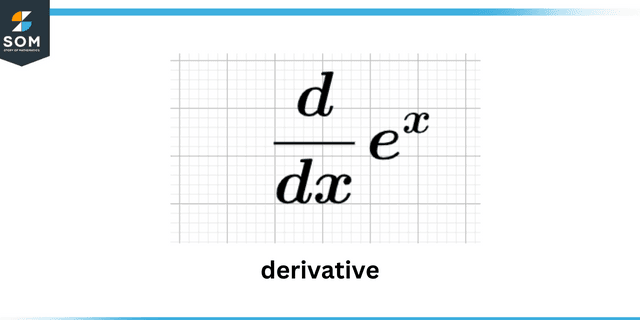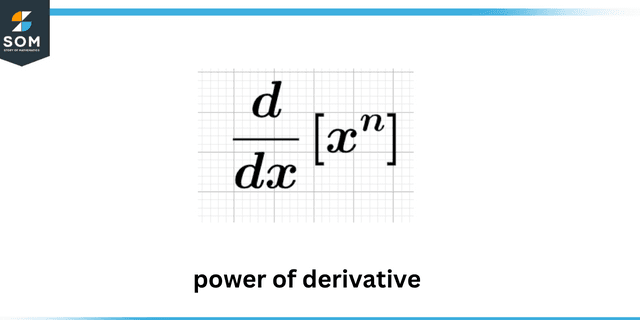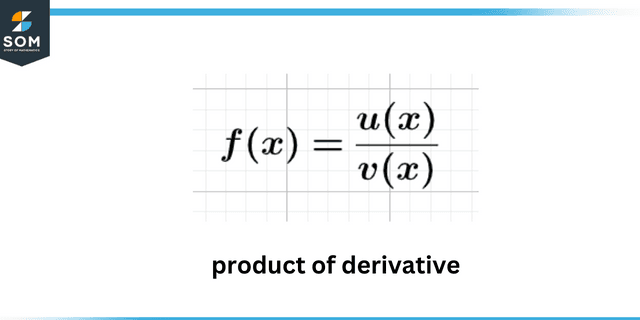
The aim of this question is to learn how to evaluate the values of a higher order derivative without explicitly declaring the function itself.

Derivative
To solve such problems, we may need to solve the basic rules of finding the derivatives. These include the power rule and product rule etc.

Power of derivative
According to the power rule of differentiation:
\[ \dfrac{ d }{ dx } \bigg ( x^{ n } \bigg ) \ = \ n \ x^{ n – 1 } \]

Product of derivative
According to the product rule of differentiation:
\[ \dfrac{ d }{ dx } \bigg ( f ( x ) \ g ( x ) \bigg ) \ = \ f^{‘} (x) \ g ( x ) \ + \ f ( x ) \ g^{‘} ( x ) \]
Expert Answer
Given:
\[ f^{‘} ( x ) \ = \ x^2 \ f ( x ) \]
Substitute $ x \ = \ 2 $ in the above equation:
\[ f^{‘} ( 2 ) \ = \ ( 2 )^{ 2 } f ( 2 ) \]
\[ f^{‘} ( 2 ) \ = \ 4 \ f ( 2 ) \]
Substitute $ f(2) \ = \ 10 $ in the above equation:
\[ f^{‘} ( 2 ) \ = \ 4 \ ( 10 ) \]
\[ f^{‘} ( 2 ) \ = \ 40 \]
Recall the given equation again:
\[ f^{‘} ( x ) \ = \ x^2 \ f ( x ) \]
Differentiating the above equation:
\[ \dfrac{ d }{ dx } \bigg ( f^{‘} ( x ) \bigg ) \ = \ \dfrac{ d }{ dx } \bigg ( x^{ 2 } f ( x ) \bigg ) \]
\[ f^{ ” } ( x ) \ = \ \dfrac{ d }{ dx } \bigg ( x^{ 2 } \bigg ) \ f ( x ) \ + \ x^{ 2 } \ \dfrac{ d }{ dx } \bigg ( f ( x ) \bigg ) \]
\[ f^{ ” } ( x ) \ = \ \bigg ( 2 x \bigg ) \ f(x) \ + \ x^{ 2 } \ \bigg ( f^{‘} ( x ) \bigg ) \]
\[ f^{ ” } ( x ) \ = \ 2 x \ f(x) \ + \ x^{ 2 } \ f^{‘} ( x ) \]
Substitute $ x \ = \ 2 $ in the above equation:
\[ f^{ ” } ( 2 ) \ = \ 2 (2) \ f(2) \ + \ ( 2 )^{ 2 } f^{‘} ( 2 ) \]
\[ f^{ ” } ( 2 ) \ = \ 4 f ( 2 ) \ + \ 4 f^{‘} ( 2 ) \]
Substitute $ f ( 2 ) \ = \ 10 $ and $ f^{‘} ( 2 ) \ = \ 40 $ in the above equation:
\[ f^{ ” } ( 2 ) \ = \ 4 (10) \ + \ 4 (40) \]
\[ f^{ ” } ( 2 ) \ = \ 40 \ + \ 160 \]
\[ f^{ ” } ( 2 ) \ = \ 200 \]
Numerical Result
\[ f^{ ” } ( 2 ) \ = \ 200 \]
Example
Given that $ f ( 10 ) \ = \ 1 $ and $ f^{‘} ( x ) \ = \ x f ( x ) $, find the value of f^{ ” } ( 10 ) $.
Given:
\[ f^{‘} ( x ) \ = \ x \ f ( x ) \]
Substitute $ x \ = \ 10 $ in the above equation:
\[ f^{‘} ( 10 ) \ = \ ( 10 ) f ( 10 ) \]
Substitute $ f(10) \ = \ 1 $ in the above equation:
\[ f^{‘} ( 10 ) \ = \ 10 \ ( 1 ) \]
\[ f^{‘} ( 10 ) \ = \ 10 \]
Recall the given equation again:
\[ f^{‘} ( x ) \ = \ x \ f ( x ) \]
Differentiating the above equation:
\[ \dfrac{ d }{ dx } \bigg ( f^{‘} ( x ) \bigg ) \ = \ \dfrac{ d }{ dx } \bigg ( x f ( x ) \bigg ) \]
\[ f^{ ” } ( x ) \ = \ \dfrac{ d }{ dx } \bigg ( x \bigg ) \ f ( x ) \ + \ x \ \dfrac{ d }{ dx } \bigg ( f ( x ) \bigg ) \]
\[ f^{ ” } ( x ) \ = \ \bigg ( 1 \bigg ) \ f(x) \ + \ x \ \bigg ( f^{‘} ( x ) \bigg ) \]
\[ f^{ ” } ( x ) \ = \ f(x) \ + \ x \ f^{‘} ( x ) \]
Substitute $ x \ = \ 10 $ in the above equation:
\[ f^{ ” } ( 10 ) \ = \ f(10) \ + \ ( 10 ) f^{‘} ( 10 ) \]
Substitute $ f ( 10 ) \ = \ 1 $ and $ f^{‘} ( 10 ) \ = \ 10 $ in the above equation:
\[ f^{ ” } ( 10 ) \ = \ (1) \ + \ 10 (10) \]
\[ f^{ ” } ( 10 ) \ = \ 1 \ + \ 100 \]
\[ f^{ ” } ( 10 ) \ = \ 101 \]
